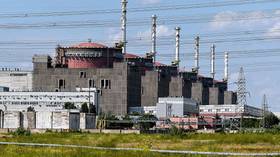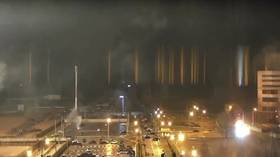‘No elevated’ radiation levels following Ukraine’s nuclear power station shelling – US

The US specialists have not recorded any spikes in radiation readings at the Zaporozhskaya Nuclear Power Plant, the US Energy Secretary, Jennfier Granholm, confirmed on Friday. Kiev has accused Russian troops of “attacking” the facility after a fire broke out in a nearby building.
“We have seen no elevated radiation readings overnight,” Granholm said in her Twitter “update” on the situation in the Ukrainian city of Energodar. “Safety systems are intact, and reactors continue to receive cooling,” she added.
Separately, a senior Pentagon official has reportedly confirmed to journalists that the situation at the nuclear power plant – the biggest one in Europe – remains under control. “We do not assess any radioactive leakage,” the official said, according to Voice of America National Security Correspondent Jeff Seldin. The Pentagon official also said the US has “no reason to doubt” that Russian forces now control the facility.
It’s important to understand that the Zaphorizhizia nuclear plant is designed to withstand significant shelling or bombardment. We have seen no elevated radiation readings overnight. Safety systems are intact, and reactors continue to receive cooling. 3/
— Secretary Jennifer Granholm (@SecGranholm) March 4, 2022
Granholm has also called on Russia to allow the plant operators to continue their work “safely,” including shift changes at both the Zaporozhskaya plant and in Chernobyl. The US energy secretary still denounced what she called an “appalling” and “reckless” action by Russia and called on President Vladimir Putin to stop the “conflict around nuclear power plants.”
We call on Putin to cease these reckless actions immediately, including conflict around nuclear power plants. 4/
— Secretary Jennifer Granholm (@SecGranholm) March 4, 2022
Earlier on Friday, Granholm said that her ministry had scrambled its Nuclear Incident Response Team and was monitoring the situation together with the Pentagon and the US Nuclear Regulatory Commission, as well as with the White House.
The move was prompted by Kiev accusing the Russian forces of targeting the nulcear power plant with munitions early on Friday. A fire also broke out on Friday morning in a training building adjacent to the six-reactor plant. Local authorities also blamed it on Russian shelling. The blaze has apparently since been put out.
The head of the UN International Atomic Energy Agency (IAEA), Rafael Mariano Grossi, said on Friday that a “Russian projectile” had hit a training center near the plant and not one of its six reactors. He also confirmed that no radiation spikes had been recorded, as did officials from Sweden and China.
Russia informed the IAEA that its forces had taken the area around the plant under control back on Tuesday, although it was not clear at that time whether they also controlled the plant itself. The Russian Defense Ministry also accused Ukrainian forces of attacking the troops patrolling the territory in an attempt to provoke a retaliatory strike and “carry out a horrible provocation.”
Ukrainian president Volodymyr Zelensky denied the provocation claims and instead warned about the grave consequences of damaging the plant. It would be "the end for everyone. The end for Europe,” he said. Ukrainian Foreign Minister Dmytro Kuleba also warned that, if the plant does blow up, “it will be 10 times larger than Chernobyl.”













